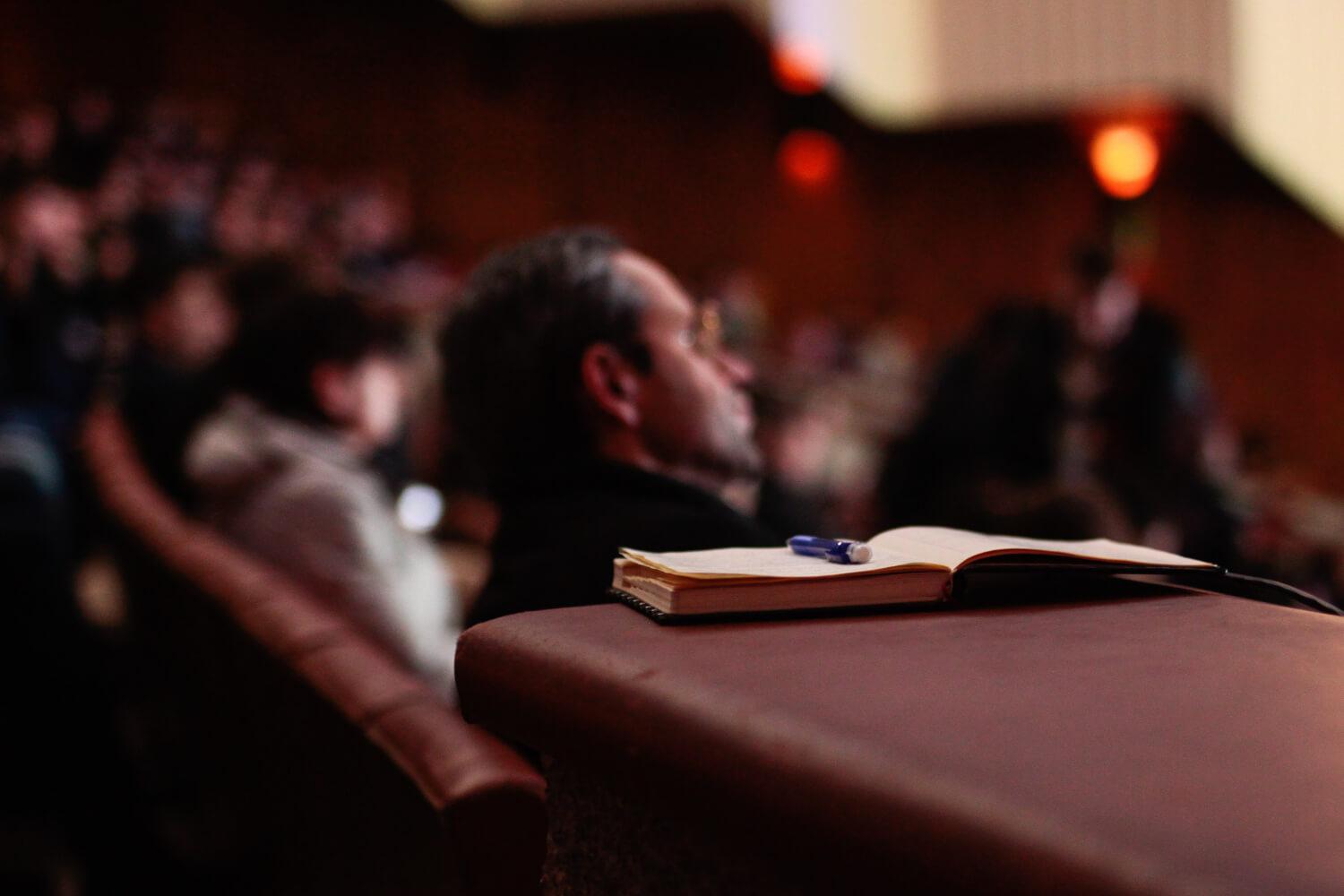
The following text is drawn from "Revitalizing and Institutionalizing Mission: Business Education at Catholic Universities," prepared by Michael J. Naughton, PhD, for Renewal of Catholic Higher Education: Essays in Catholic Studies in Honor of Don J. Briel, published by the University of Mary in 2017. Slight alterations have been made to the text. This is the second of a four-part series, which begins with "Institutionalizing a Catholic Culture in Professional Schools."
Catholic universities and their business programs speak of the importance of ethics, service, diversity and pluralism as mission-driven activities, but while these characteristics are important to any institution that calls itself Catholic, they are not unique or distinctive to Catholic institutions.1 If Catholic universities genuinely hope to add to the pluralism necessary for business education to flourish, they and their business schools must fully engage the depth of their Catholic mission and identity and speak from their center, which draws upon the best their tradition has to offer. At the heart of this center are two major convictions of the Catholic intellectual tradition that need to animate Catholic business education: unity of knowledge and the complementarity of faith and reason.2
1. The Unity of Knowledge and the Integration of Liberal and Business Education3
Concerning the unity of knowledge, John Henry Newman explains that a university is concerned with the cultivation of the intellect to see things whole (as opposed to seeing things merely functionally and specifically). He uses the metaphor of the curriculum as “a circle of knowledge,” where all the disciplines serve each other in a relationship of mutual correction and completion.4 The exclusion of one portion of the circle of knowledge leaves not merely an absence of a particular intellectual claim but creates a disorder within the entire circle for the mutual relations among the disciplinary perspectives. The unity of knowledge reminds us that each discipline is not an isolated set of facts leading only to more specialized explorations. The “uni-versity,” which by its very name implies unity of knowledge, should enlarge the mind’s capacity to connect different disciplines in search of a more holistic view of the world. The minds of students need cultivation to develop an integration of knowledge, which, though a noble end in itself, also prepares them to make intelligent judgments that lend to their own transformation and that of the world. As Alasdair MacIntyre explains, a Catholic education should provide for the student “an integrative vision of the human and natural orders, as well as of the supernatural order, one that could inform not only education, but the subsequent lives of the educated, by providing them with a standard for identifying and criticizing the inadequacies of the social orders that they inhabited.”5
Within this tradition, liberal education is not an exploration of one more technical skill to be achieved, but of a deepened and matured receptivity of the world’s wonders and humanity and of the transcendent. If it has not lost its coherence, if it has not lost its center, if it is not closed off to the practical, a liberal education can create the soil in which the business student may think imaginatively, philosophically, theologically, and spiritually about the world, humanity, and business.
In many respects, this vision of liberal education, which serves as the soil in which business education can take root, is the most challenging curricular dimension of an authentic Catholic business education. Liberal education in many Catholic universities has lost sight of an education that nurtures an experience of wonder about the being of things; instead, it has become a “general education,” a prescribed number of units in a prescribed distribution of disciplines that provides a multicultural tourism of discrete and specialized forms of knowledge that are unconnected from each other.6 Without an understanding of liberal education based on a unity of knowledge, the reality of a holistic education with deep moral and spiritual roots within business remains unrealized.
Unity of knowledge serves as a significant formation to the study of business within the context of a liberal education. As an extension of liberal education, business education is first and foremost a serious engagement with reason. It seeks a reasonable way to do things and creates in the student the habit of discerning why things are done. Within business education at a Catholic university, reason will indeed be concerned with the instrumental rationality of how to get things done, but in its curriculum it should also be concerned, precisely because of its liberal education context, with an encounter with a moral rationality, engaging the business student in the deeper questions of business: the nature of the human person, work and profession, property and capital, the difference between wants and needs, the role of business within society and its impact on the poor. A Catholic business education should never merely be a training in the “how” of things but an education exploring “why” they are done, and it should also examine the relationship between the “how” and “why.”7 Newman had similarly warned that if professional education became severed from the liberal arts within the university context, its inclination would always tend to focus on the particular and instrumental at the expense of the universal and moral, and as a result would “undermine the broader pursuit of the unity of knowledge at the heart of the university’s mission.”8
A liberal education within the Catholic intellectual tradition provides an interdisciplinary experience for the business student, which opens him or her up to a more comprehensive vision of the unity of knowledge. Within the student, this interdisciplinary frame of mind fosters an understanding of life and a set of habits that create a view of business that is both noble and good. These habits are:
- The theological habit of wonder and a sacramental/incarnational vision of life.
- The philosophical habit of “pushing things up to their first principles” (of the person, property, work, contracts, language, and so on).
- The historical habit of time and recovering the tradition of their professional practice.9
- The literary habit of imagination.
- The scientific habit of discovery.
- The business habit of innovation, creativity, and effectiveness.
These habits help us to see the insight of Newman’s dictum: “Who has been trained to think upon one subject or for one subject only, will never be a good judge even in that one.”10 Specialization in business without the broader engagement of a liberal education disorders business, usually in terms of a fixation on financial goals. The integration of a business and liberal education will help foster within students the habit of seeing things whole, which increases the probability of students being able “to come to the full measure of their humanity.”11
2. Dialogue of Faith and Reason and the Vocation of Business
The second conviction of a Catholic university is the dialogue and complementarity between faith and reason. A Catholic university’s privileged task is “to unite existentially by intellectual effort two orders of reality that too frequently tend to be placed in opposition as though they were antithetical: the search for truth [reason], and the certainty of already knowing the fount of truth [faith].”12 Within the Catholic intellectual tradition, faith enhances reason; it does not replace or subtract from it. Or in the more traditional language, “grace perfects nature, it does not destroy it.” Faith without reason tends toward superstition, fundamentalism and fatalism. Reason without faith tends toward an inhuman efficiency, instrumentalism and lack of community. Both distort reality. The more significant danger in the academy, however, is the marginalization of faith and theology from intellectual discourse. As Bill Byron S.J. put it, a Catholic university that fails to engage in this conversation of faith and reason and is closed to the search for God is an incomplete university.”13 The unique character of the Catholic university is to nurture reason’s inquiry toward Christian faith’s desire for a “comprehensive experience in understanding.”14
When faith and reason fail to operate within business education, it fosters what Gaudium et spes has called one of the more serious errors of our age: “[t]he split between the faith which many profess and their daily lives,” especially their professional lives.15 We live in an age that fosters rather than resists this split. In the very language and categories we use to describe our lives, we no longer see distinctions but separations or walls between public and private, faith and work, spirituality and religion, church and state. Alasdair MacIntyre describes this particular modern division as “compartmentalization”:
If this privatization of faith is to be avoided by our business students, Catholic universities must draw upon resources that are robust enough to engage students in a discernment of their state of life (which should qualify and condition every other role) and their vocation to business (understanding business more as a “calling” than merely a “job” unrelated to the rest of their life).18 While courses in ethics and service-learning are helpful, they are often not strong enough by themselves to challenge this human and particularly modern problem of compartmentalization.
An institution that strives to act on such serious convictions as the two above will always experience collisions, tensions, and confusions. At Catholic universities, there is a confidence that this unity of knowledge and dialogue of faith and reason will, at the end of the day, produce a higher synthesis of knowledge and deeper wisdom that is at the heart of a mission-driven Catholic business education. For students, this higher synthesis expresses itself in their experience of the following:
- An imaginative encounter of the wonder of the world.
- An interdisciplinary engagement within the curriculum, especially between theology, philosophy and business.
- A deep emphasis on spiritual meaning and the vocation of business.
- A constant experience of ethics across the business curriculum, especially the integration of virtue, technique and principles from the Catholic social tradition, such as human dignity, common good, dignity of work and its subjective dimension, the social nature of property, just wages, fair prices, etc.
- An encounter with the poor through service-learning.
- An emphasis on social businesses and their role in alleviating poverty.
- An experience of various non-curricular activities such as retreats, liturgies, prayer, mission trips, and volunteerism.
The question now is whether the university has a faculty that can provide such experiences for students.
1 Thomas Mengler, “Why Should a Catholic Law School Be Catholic?” Journal of Catholic Social Thought 7, no.2 (2010): 211-29.
2 Using Newman, Don Briel points out that the Church plays a critical role with these convictions for the Catholic university. He explains that “Newman predicted that in the absence of the Church the university would shift from its traditional emphasis on knowledge for its own sake to a pursuit of power or aesthetic taste, what he often called mere sentimentality. Of course the modern university has tended in both directions at once. For, without a comprehensive and coherent intellectual tradition which can secure the tensions at the heart of a claim to a unity of knowledge, the circle of knowledge will break down into isolated and autonomous disciplinary guilds and with the removal of a vibrant ecclesial theology, the ultimate complementarity of faith and reason will be equally undermined.” Don Briel, “The Idea of a University: A Contemporary Reappraisal” (unpublished lecture, last modified August 29, 2014, http://www.donbriel.org/articles/).
3 Many of the ideas in the following section come from various conversations I have had with Don Briel.
4 See John Henry Newman, The Idea of the University, “Discourse 3. Bearing of Theology on other Branches of Knowledge,” http://www.newmanreader.org/works/idea/discourse3.html.
5 Alasdair MacIntyre, “Dangers, Hopes, Choices,” in Higher Learning & Catholic Traditions, ed. Robert E. Sullivan (Notre Dame, IN: University of Notre Dame Press, 2001), 16.
6 See Ernest Pierucci, “Restoring the Broken Image: The Centrality of the Subjective Dimension of Labor and Liberal Education in Catholic Business Education,” paper presented at the 7th International Symposium on Catholic Social Thought and Management Education, University of Notre Dame, Notre Dame, Indiana, June 11-13, 2008.
7 See also Josef Pieper, who explains that “[t]raining is distinguished by its orientation toward something partial, and specialized, in the human being, and toward some one section of the world. Education is concerned with the whole: whoever is educated knows how the world as a whole behaves. Education concerns the whole human being, insofar as he is capax universi, ‘capable of the whole,’ able to comprehend the sum total of existing things.” Leisure the Basis of Culture (South Bend, Indiana: St. Augustine’s Press, 1998), 23-24. As Benedict XVI stated to European university professors on the theme of a “new humanism” and the role of universities, reason needs “to be ‘broadened’ in order to be able to explore and embrace those aspects of reality which go beyond the purely empirical.” “Address to the Participants in the First European Meeting of University Lecturers,” June 23, 2007, Libreria Editrice Vaticana, http://w2.vatican.va/content/benedict-xvi/en/speeches/2007/june/documents/hf_ben-xvi_spe_20070623_european-univ.html.
8 See Don Briel’s essay on Newman’s understanding of professional education.
9 See S.A. Zeff, “Does Accounting Belong in the University Curriculum?,” Issues in Accounting Education 4, no. 1 (1989): 203-10.
10 John Henry Newman, The Idea of a University (Notre Dame, IN: The University of Notre Dame Press, 1982), Discourse VII, 9.
11 John Paul II, Ex Corde Ecclesiae, §5.
12 Ibid., 1.
13 Bill Byron, “Commentarii de Constitutione Apostolica Ex corde Ecclesiae,” Seminarium.
14 Michael Buckely, “The Catholic University and Its Inherent Promise,” America 168, no. 19 (1993): 14-16.
15 Vatican Council II, Gaudium et Spes, §43.
16 Alasdair MacIntyre, “Moral Philosophy and Contemporary Social Practice: What Holds Them Apart?,” in The Tasks of Philosophy: Selected Essays (Cambridge: Cambridge University Press, 2006 ), 117.
17 Gustavo Gutierrez, A Theology of Liberation (New York: Maryknoll, 1973), 224.
18 See Pontifical Council for Justice and Peace, Vocation of the Business Leader, http://www.pcgp.it/dati/2012-05/04-999999/Vocation%20ENG2.pdf.

Next: The State of Business Education at Catholic Universities
Few Catholic universities integrate a Catholic vision into their business programs, and few theologians have engaged questions of business.

Previous: Institutionalizing a Catholic Culture in Professional Schools
The mission drift experienced by so many Catholic professional schools is rarely intentional, and the proper response is to institutional mission.


